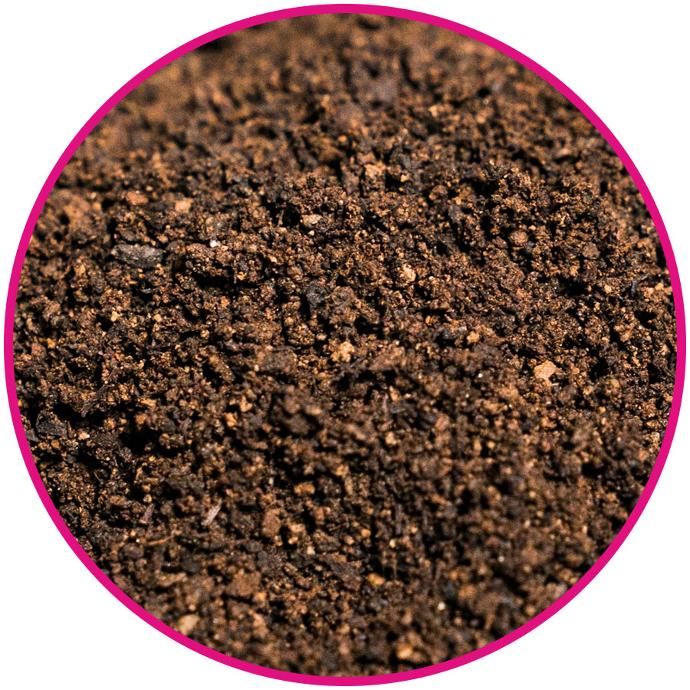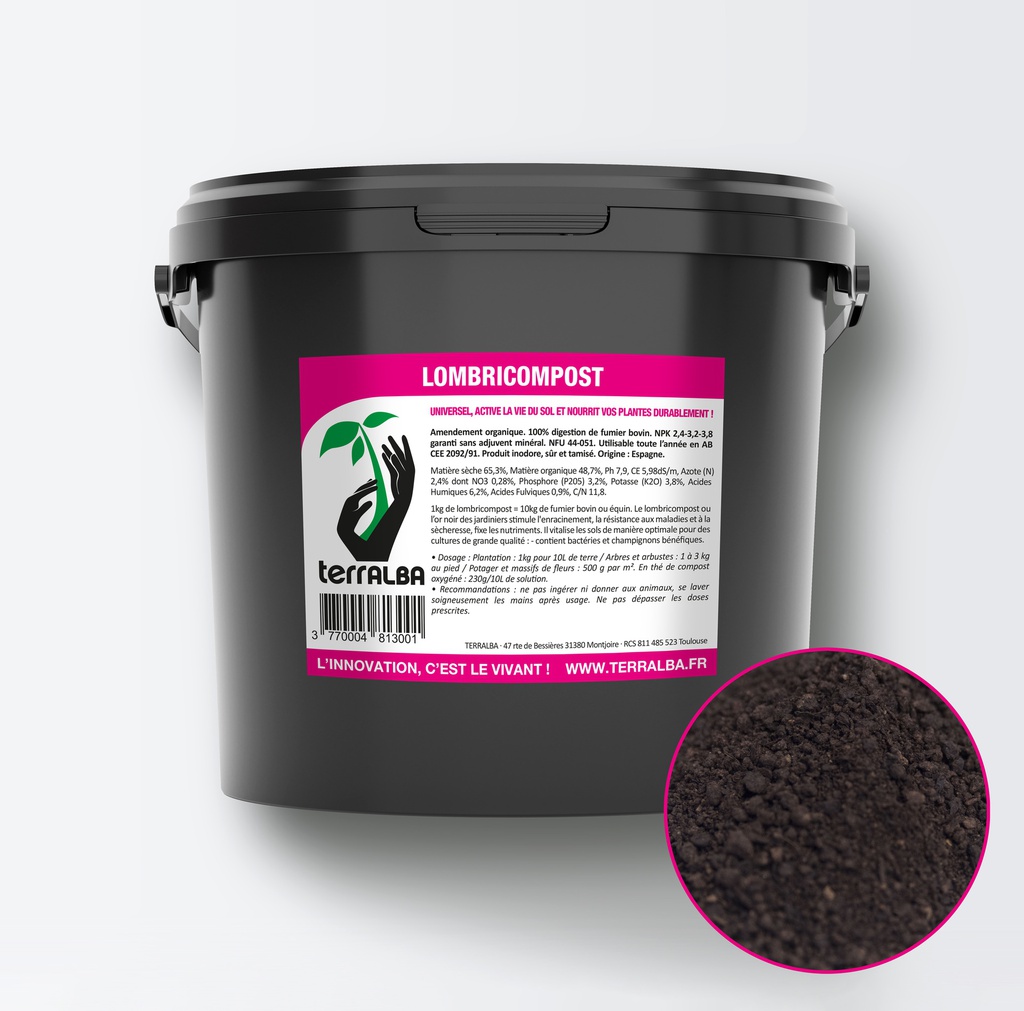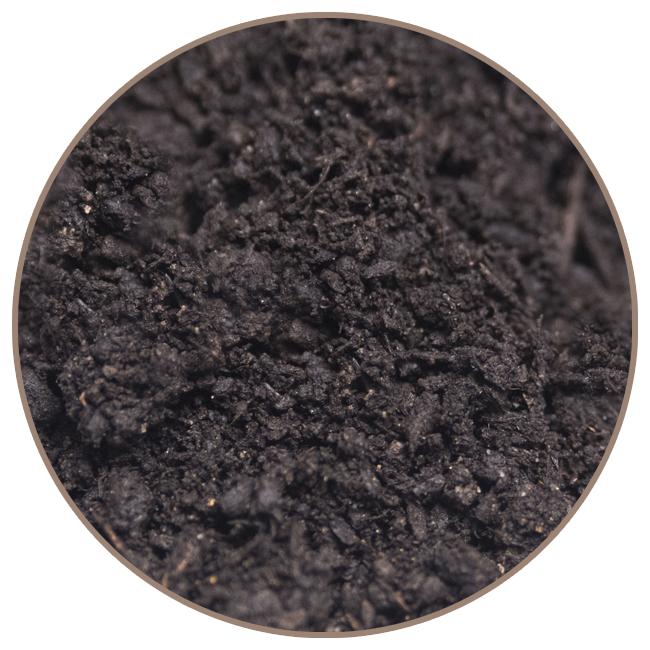VERMICOMPOST: growth, flowering, universal
LOMBRICOMPOST: rooting, disease resistance, growth, soil life.
Click & Collectin-store available
Conditions générales
48h business day shipping
Find our store dedicated to professionals on ActBioSystem.com
Need more volume?
Can be used in AB all year round
Activates livingsoil
For all types of plants
Improving soil structure
Vermicompost creates looser, aerated, draining soil, which encourages plant growth.
Increases soil water retention
Vermicompost has a high water retention capacity, which can be useful for plants in times of drought.
High in natural nutrients
Vermicompost is rich in nutrients such as nitrogen, phosphorus and potassium, which are essential for plant growth.
Encouraging biodiversity
By using vermicompost, you can contribute to the creation of a living soil rich in micro-organisms, which can promote biodiversity in your garden or vegetable patch.
Universal, activates soil life and nourishes your plants over the long term
Vermicompost provides the plant with nutrients such as nitrogen, phosphorus and potassium, which are essential for its growth. It also contains numerous trace elements and micro-organisms that can be beneficial to the plant.
Vermicompost also has a high water-holding capacity and can improve soil structure, which can be beneficial for plants. By using vermicompost, you can promote the growth of your plants in a natural and environmentally-friendly way.
Vermicompost is a fertilizer and organic amendment with a top-of-the-range formula. Totally natural, it results from the digestion of bovine and equine manure by earthworms. The earthworms transform this waste into a compost rich in nutrients and micro-organisms beneficial to plants.
Vermicompost has a fine, crumbly texture, brimming with essential nutrients such as nitrogen, phosphorus, potassium and other microorganisms beneficial to plants. Its use improves soil quality, promotes plant growth and contributes to environmental conservation by reducing organic waste.
Vermicompost is a natural source of nutrients and organic matter for plants, and can be used as a fertilizer or soil improver. It outperforms compost, thanks to the work of the earthworm (E. Foetida), which transforms manure into super compost! 10kg of manure are needed to obtain 1kg of vermicompost.

It can be used in gardens, vegetable patches, window boxes and terraces, and is suitable for all kinds of plants, whether ornamental or vegetable.
How to use vermicompost?
Garden and flower beds
500gr/m2 by scratching.
Scrape the surface of the soil with a claw or similar tool to aerate it and break up any surface crust that may have formed. Alternate between scratching and adding vermicompost.
Mixing / Planting
1kg/10L of potting soil or mix
Pour your soil and vermicompost into a large container at a ratio of 100g of vermicompost per liter of soil. Mix until homogeneous.
Tree and shrub
1 à 3 Kg at the foot by scratching.
Alternate between scratching and adding vermicompost. Scrape the soil surface with a claw or similar tool for 1 to 2m around the trunk, depending on the estimated size of its roots.
Thé de compost Oxygéné
230g/10L of solution
Vermicompost is one of our recipes for oxygenated compost teas. You can create your own, or take a look at our pre-calibrated packs and live soil cultivation machines.
Informations :
Exceptional NPK : 2,4-3,2-3,8
guaranteed without mineral additives
NFU 44-051.
Can be used all year round in AB CEE 2092/91.
Origin : Spain.
Recommendations :
Do not ingest or feed to animals. Wash hands thoroughly after use. Do not exceed prescribed doses.
Composition
Composition :
• Analyses du 01-06-2019 :
• Matière sèche 65,3%
• Matière organique 48,7%
• Ph 7,9 CE 5,98dS/m
• Azote (N) 2,4% dont NO3 0,28%
• Phosphore (P205) 3,2%
• Potasse (K2O) 3,8%
• Acides Humiques 6,2%
• Acides Fulviques 0,9%
• C/N 11,8





![[TERREAUH10] TERREAU HORTICOLE INNT / Interior (10Kg / 25L)](/web/image/product.product/4329/image_128/%5BTERREAUH10%5D%20TERREAU%20HORTICOLE%20INNT%20-%20Interior%20%2810Kg%20-%2025L%29?unique=2e4f57a)
![[TERRE4C10] TERREAU X4 COMPOSTS EXT&INT equine, ovine, bovine, vegetable (10Kg / 25L)](/web/image/product.product/4330/image_128/%5BTERRE4C10%5D%20TERREAU%20X4%20COMPOSTS%20EXT%26INT%20equine%2C%20ovine%2C%20bovine%2C%20vegetable%20%2810Kg%20-%2025L%29?unique=0f998c3)
![[BV1] Volcanic Basalt: Improve Your Soil with a Natural and Sustainable Amendment (1Kg)](/web/image/product.product/79/image_128/%5BBV1%5D%20Volcanic%20Basalt:%20Improve%20Your%20Soil%20with%20a%20Natural%20and%20Sustainable%20Amendment%20%281Kg%29?unique=de4ecc5)